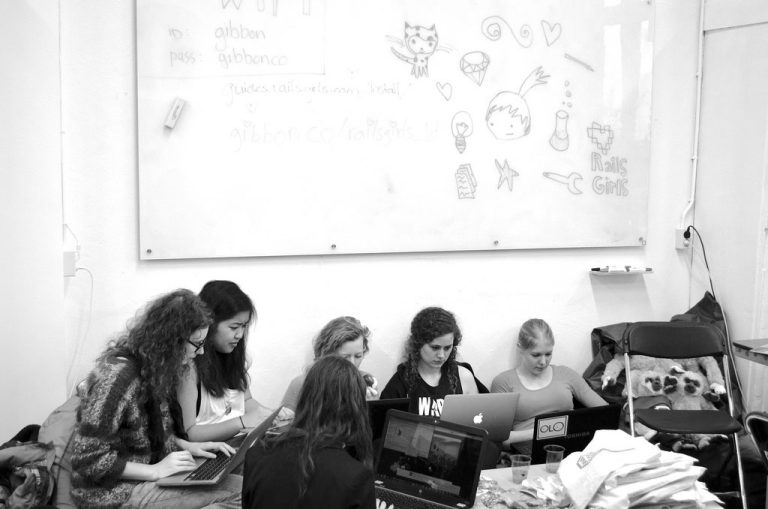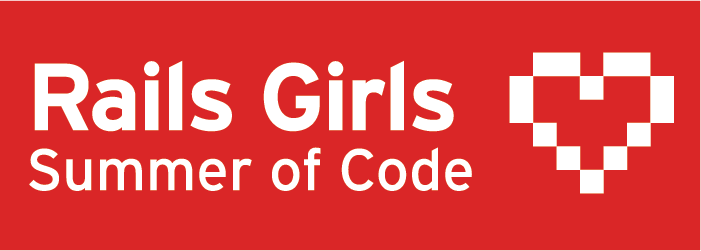Rails Girls Summer of Code – Bringing Diversity to Open Source

With the awesome power of community behind it, open source can reach in, shake up and improve every aspect of our lives. That’s a big part of its draw. For those among us struggling to kickstart a career in coding, experience in FOSS can facilitate routes into the all-too-elusive tech world. Yet these opportunities are not equally available to us all.
The tech industry was recently described to me as suffering from “testosterone poisoning”. Strong words, but it’s true; gender diversity in open source remains staggeringly poor. Only 3% of respondents to GitHub’s 2017 Open Source Survey were women, and just 1% identified as non-binary. DigitalOcean’s trends report, which was slightly more reassuring with a 9% female response rate, gives us an insight into the issue: 65% of women said they would likely participate in open source if only they had the resources.
Travis Foundation was ahead of the game when it launched Rails Girls Summer of Code in 2013. The aim was to bring more beginner-level programmers who identify as female (transgender and cisgender), including non-binary, into open source.
The idea is two-fold: link participants with coaches and mentors to work on real-world open source projects, and offer scholarships to alleviate financial pressures so students can focus on learning. For a full three months (July-September), teams make meaningful contributions while developing technical skills, learning collaborative practices, and expanding their professional networks. That sound you hear is the creaking of the door to opportunity being prised open.
Why is diversity so important? For all its strengths, if the open source community fails to reflect the world’s myriad populations, we shut out valuable streams of innovation.
Humans are complex creatures. Our opinions, ideas, perspectives, and motives are fueled by a lifetime of experiences and interactions. Each of us is a walking, talking representation of the societies, geographies, interests, obligations, conversations, customs, and hardships that shape us. If necessity is the mother of invention, then diversity is what drives us to challenge the norm. It sparks creativity and change. It stands to reason that the more differences tech embraces, the more relevant it becomes.
The response from the Rails Girls Summer of Code community shows this is not an isolated idea. In 2018, we received a staggering 195 applications from teams wanting to participate. As a non-profit initiative, each of the 200+ scholarships from the past 6 seasons has been fully community-funded. That is both astoundingly reassuring, but also the warning call of a community that senses the damaging absence of diverse representation.
Don’t be fooled by the name. In many parts of the world, July isn’t summer season.
Rails Girls Summer of Code has grown from a tight-knit group benefitting Berlin’s local Ruby chapters into a language-agnostic program with a global reach. The program has brought together teams from places as disparate as India and Egypt, Kenya and Canada, Australia and Albania, the UK and the USA, Cambodia and South Korea, as well as many others that don’t easily alliterate.
The big question is, does it work? In a word, yes.
A survey in 2017 revealed that 97% of our alumni went on to work in tech, some landing programming roles at household names and big-hitters like Ecosia, Goldman Sachs, Adobe, and Microsoft. Creating positive role models is essential to what we are trying to achieve. Each year, more non-male mentors join RGSoC and it’s common for students to pay it forward, returning to offer vital support as coaches and organisers. The tech tide is turning.
If we are to truly make a difference, however, we must sustain this momentum. The community is core to that and we do not take this for granted. We are grateful to all our supporters for sharing in the RGSoC vision of a more diverse digital landscape and for helping us to promote inclusion in the industry.
As experts in open source, LPI members are perfectly placed to support Rails Girls Summer of Code student teams. Applicants are now searching for coaches to guide them in their programming challenges, find solutions to trickier issues, and generally get to know how the process of coding works. If you’re spurred on by the idea of helping someone discover the same excitement in open source as you have, our guide to being a coach should definitely be on your reading list.

